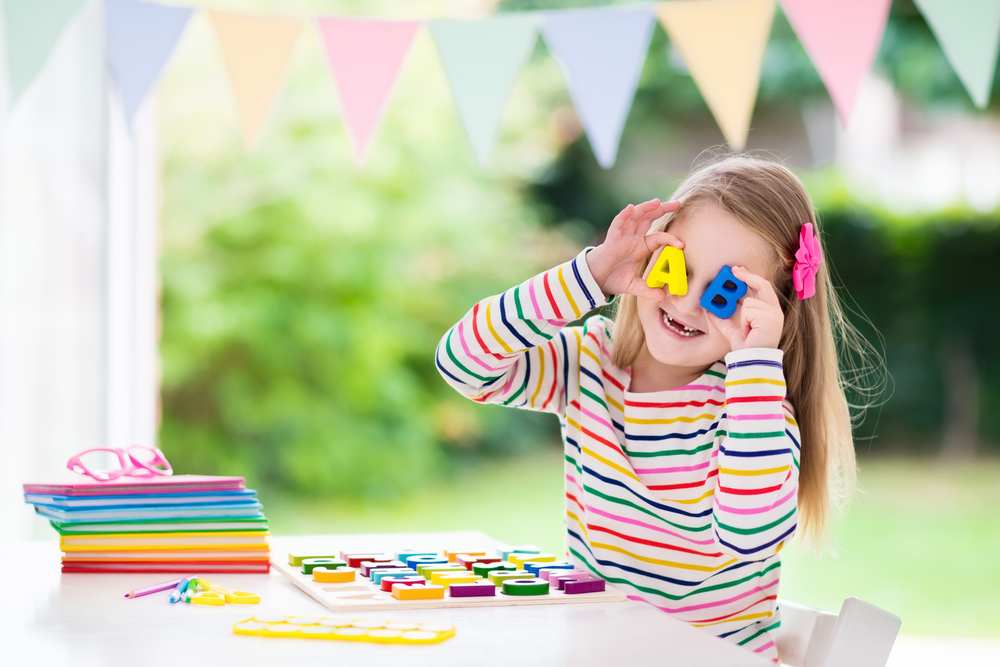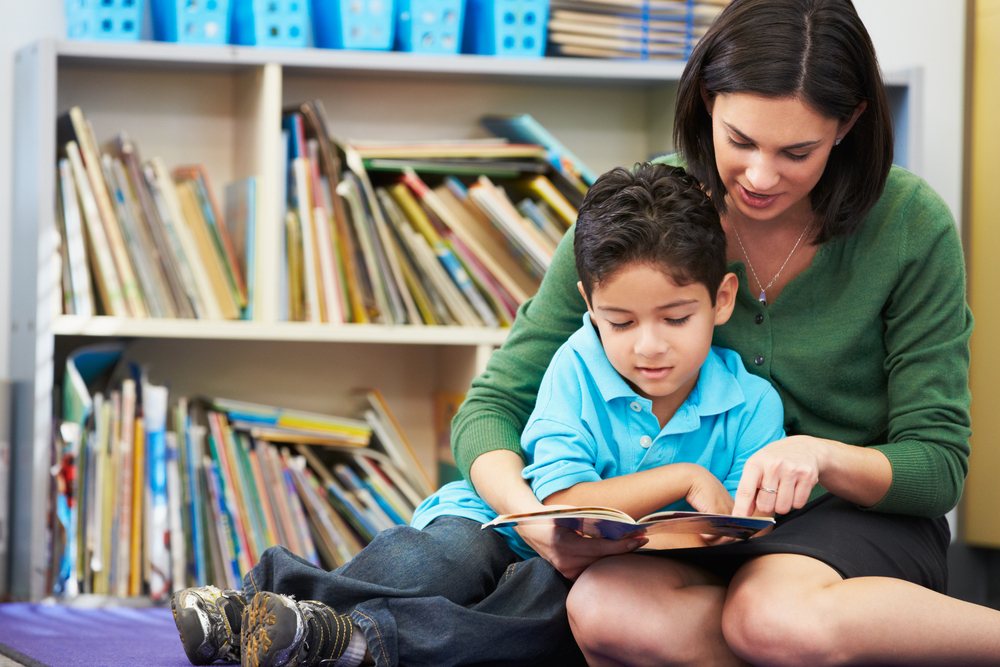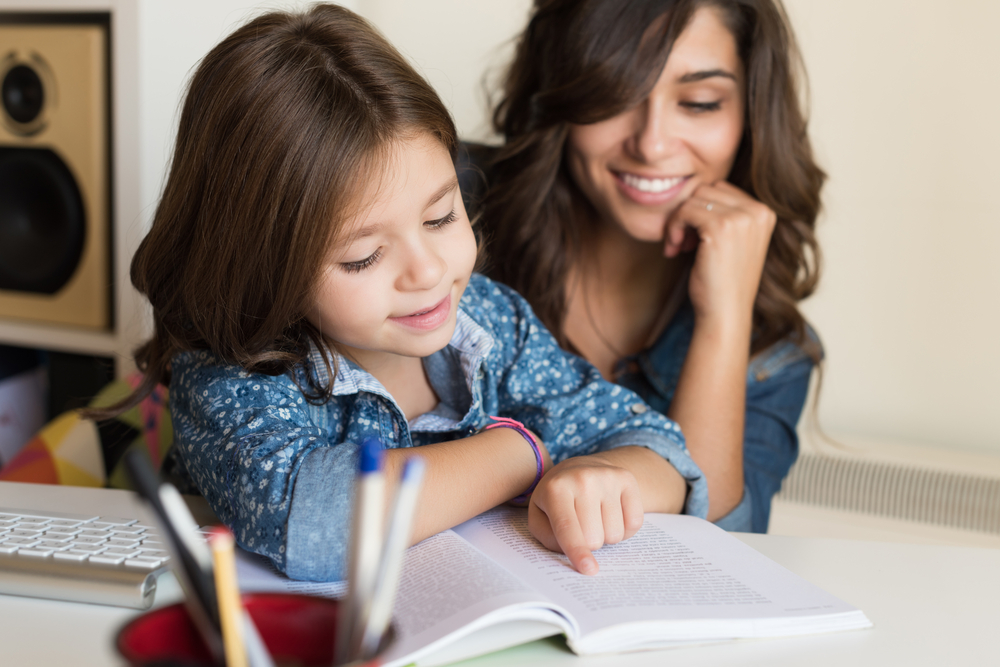
Children might express an interest in books and reading at a young age. As long as the child is interested in learning to read, it’s never really too soon to start teaching children the basics of decoding and other literacy skills. In addition, reading together can help all children learn new words and become interested in books and stories.
For children who are eager to begin their reading journey, parents might find that teaching kids to read requires patience. Teaching kids to read also can be guided by utilizing a few tips and resources, too. Here are 10 helpful tips for guiding the literacy journey at home to help children learn to read:
- Don’t ditch reading aloud to children.
- Practice the alphabet with children and teach the sounds of each letter.
- Start with simple books to help children learn to decode.
- Download the list of kindergarten sight words and help children practice these words.
- Encourage children to explore their local library and pick out their own books.
- If children become discouraged, don’t push.
- Understand that all reading is beneficial.
- Read wordless books to teach children about the parts of stories.
- Use games and activities to complement books.
- Consider using a reading program at home for lesson-based instruction.
When Do Kids Start Reading?
Parents might wonder if their child is ready to read. When do kids start reading? Children are ready to read at different ages.
Some children might be interested in learning to read at a very young age. In fact, decoding could be easy for them.
Preschoolers also could have older siblings and want to begin reading because they see their brother or sister reading independently. If children are expressing an interest in learning to read, parents might decide to start helping their child to learn how to sound out words when reading together.
Some children might not be ready to read until they are a bit older (perhaps in kindergarten). Again, children develop differently; not all children are ready to read when they are in preschool.
Teaching Children to Read: Don’t Ditch Storytime
Even when children are expressing an interest in learning to read, parents should still read aloud to them. Storytime is a great bonding experience, and it helps children become exposed to more words, stories and ideas.
In fact, children who read five books a day before starting kindergarten were exposed to more than a million more words than children whose parents didn’t read to them. This knowledge gap shows that reading aloud to children helps them build their vocabulary and word knowledge.
While teaching children how to decode words and helping them understand letters and sounds is integral to learning to read, hearing stories read aloud is important, too. Don’t stop enjoying storytime with children even when they are learning to read on their own.

How to Teach My Child to Read: Practice the Alphabet and Help Children Focus on Phonics
The alphabet is the code to reading. Before children can learn how to read, they need to understand and master the letters of the alphabet. Sing the alphabet song and play games focused on identifying the letters of the alphabet to help children master the recognition of each letter.
Once children learn their letters, parents can begin to teach the sounds. Vowels can say their name and have a softer sound, too. Use pictures that begin with each letter to help children understand the sounds each letter makes. Make sure children learn to identify both the uppercase and lowercase letters.
As children begin to master both their alphabet and their sounds, they can work on how the vowels can change their sounds. Sometimes understanding the rules of vowels can be tricky for kids.
Parents who are looking for fun ways to help children with their letters can search for old episodes of The Letter People via YouTube. The Letter People was a show popular in the 70s/80s that helped children learn their letters; each letter was a character that featured attributes that nodded to the letter’s sounds. For example, Mr. M had a ‘munching mouth.’
How to Teach a Child to Read: Use Simple Books to Keep Lessons Basic
If a child is ready to read, parents can help them begin learning to sound out letters using very basic books designed at the earliest reading level. Some books make it easy for parents to understand the reading level.
However, if parents are unsure about what books to choose, they can visit their local library and talk to a librarian for recommendations on the best way to learn to read books. Book stores offer a children’s section and employees also could help parents find the best books to help children learn to read.
Teaching Kids to Read: Find Sight Word Lists for Kindergarten Online
In kindergarten and early elementary grades, children will be expected to memorize a list of sight words. These words must be identified by children on sight—thus, why they are called sight words. Memorizing sight words helps simplify the reading journey, as children don’t have to think about decoding sight words.
Parents who are helping their children learn to read can find sight word lists online. These lists are typically pulled from the Dolch List of Sight Words. The Dolch List is typically divided up for different grade levels.
The kindergarten list focuses on the easiest words; children can begin to memorize this list to help them as they learn to read. Parents can make flash cards for sight word practice, and they also could create match games. Use index cards for flash cards and match games.
To play sight word match games, make two cards for each word, shuffle the deck and lay cards face down; parents and children then take turns trying to find matches. Encourage children to say the word when they turn over each card.

Explore the Library
The public library is a free source of reading materials. Children might enjoy visiting their local library and exploring the children’s section of books.
Let children choose the books that interest them. This helps children discover the books they like and find authors that they enjoy. If a book is at a reading level that is too hard, parents can read it aloud.
If Children become Discouraged, Don’t Push
Reading isn’t easy for every child. If parents are teaching children to read before kindergarten, preschoolers might become discouraged or frustrated. If this happens, don’t push.
Remember that reading is supposed to be fun. Treating books like homework before a child is even in kindergarten could make them dislike reading.
If parents realize their child is frustrated, it’s ok to stop the lesson. Praise them for their hard work, and ask them if they want to hear the story read to them.
All Reading is Beneficial
Does a preschooler or kindergartener love comic books or reading a specific magazine? These alternative reading materials are still beneficial for the reading journey.
Any book, magazine, newspaper or other material that encourages a child to read (and is appropriate) can help children learn to enjoy reading. Some children (and adults) love collecting and reading comic books. Others read a specific newspaper every morning.
Wordless Books Spark Creativity
Wordless books only feature pictures. These books require the children to create the plot and perhaps even name the characters. Wordless books can help children understand the parts of a story and become creative storytellers, too.
Parents also can encourage children to make their own wordless books. Use construction paper or printer paper for these DIY books. Children can create pictures for a unique wordless book.
Use Games and Activities to Complement Books
Some books might feature a character visiting a certain museum or historical site. Others might feature dinosaurs and focus on prehistoric adventures.
Games and activities can be used to complement the reading journey. Take children on book field trips to a museum that nods to the book or another cool location. Make recipes to recreate foods characters eat (have children read the ingredients). These unique activities can help children immerse in the story.
Use a Reading Program for Lesson-Based Instruction
If parents want to help children learn to read but don’t have the time to help their child, they can use a lesson-based reading program at home. Readability offers a 24/7 AI tutor built into the program that learns each child’s voice as they read aloud; the tutor can provide help when the child struggles.
Readability is leveled to ensure children advance when they demonstrate mastery. Sign up for a free seven-day trial period to explore Readability to encourage children to begin their reading journey.

 Español
Español